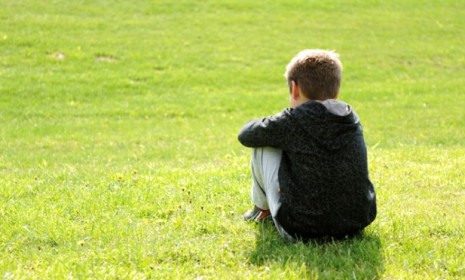Is the 'scary' rise in autism actually good news?
The number of U.S. children diagnosed with autism jumps sharply — but surprisingly, autism advocates aren't exactly upset

A free daily email with the biggest news stories of the day – and the best features from TheWeek.com
You are now subscribed
Your newsletter sign-up was successful
The feds released some eye-popping numbers on Thursday: About 1 in 88 children now has autism or a related disorder, a 23 percent jump from 2006 and a 78 percent spike from 2002, when the Centers for Disease Control and Prevention (CDC) first started reporting autism figures. These new numbers are certainly "scary," says Jeanne Sager at The Stir. But as hard as it may be to believe, "there's good news for parents, if you know where to look." Here's what you should know:
Just how big of a problem is autism?
If one in 88 kids has autism or an autism spectrum disorder (ASD) — including the less-severe Asperger's syndrome and "pervasive developmental disorders not otherwise specified" (PDD-NOS) — then about a million kids and teenagers are affected, and the disorder is almost twice as common as believed a decade ago. "Autism is now officially becoming an epidemic in the United States," says Mark Roithmayr, president of the advocacy group Autism Speaks. "We are dealing with a national emergency that needs a national plan."
The Week
Escape your echo chamber. Get the facts behind the news, plus analysis from multiple perspectives.

Sign up for The Week's Free Newsletters
From our morning news briefing to a weekly Good News Newsletter, get the best of The Week delivered directly to your inbox.
From our morning news briefing to a weekly Good News Newsletter, get the best of The Week delivered directly to your inbox.
What else did researchers discover?
Since 2002, the CDC has been tracking 8-year-olds in 14 states, looking not just at diagnosed cases, but also studying the medical records of children with autism-like symptoms. Among the diagnosed cases, 44 percent have full autism, 47 percent have PDD-NOS, and 9 percent have Asperger's. Autism and ASDs were five times more common in boys than girls.
So... what's the good news?
First, "there is the possibility that the increase in cases is entirely the result of better detection," says CDC chief Dr. Thomas Frieden. More diagnoses — especially among black and Latino kids — means those kids can get help, autism writer Shannon Des Roches Rosa tells Babble. "Just as important," says The Stir's Sager, is that "the more people who have a certain disease, the more attention it gets." And numbers like this should "push Congress to pour more money into research to help parents find answers."
A free daily email with the biggest news stories of the day – and the best features from TheWeek.com
Are we any closer to understanding what causes autism?
Not really. But as soon as the new CDC numbers came out, "advocacy groups jumped on the news to promote their theories and agendas," says David Brown in The Washington Post. Autism Speaks' Roithmayr doesn't believe that better detection accounts for more than half of the jump in cases. "Something [else] is going on here," he says, "and we don't know" what it is. Scientists tend to attribute autism to genetics, advanced parental ages, and premature births, while advocates focus on environmental factors like mercury, pollution, and, controversially, vaccines — something studies have repeatedly found unrelated.
Is there anything all sides agree on?
Yes, "the advocates and scientists do agree on one fact," says Nancy Shute at NPR: "Too many children miss out on an early diagnosis, which could lead help them get behavioral therapies early on, when they do the most good." The average age of diagnosis now is 4 years old, a six month improvement over 2006, but the optimal age is 18 months. "It's really important for parents who have concerns to bring them up," says pediatrician Susan Hyman. "And it's important for them to be persistent. Any concern a parent has has to be taken seriously. Don't defer."
Sources: Babble, NPR, Slate, The Stir, TIME, Washington Post